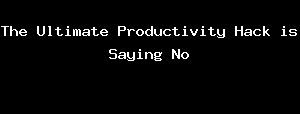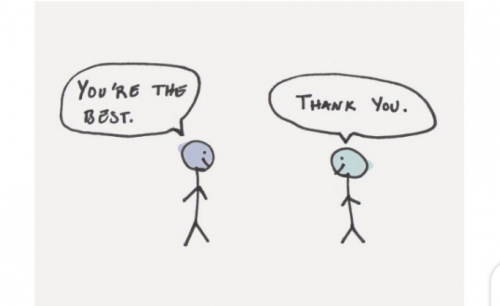profile/5819Screenshot_20200808-231425.png
SamuelOz

The Ultimate Productivity Hack Is Saying No
~2.7 mins read
The ultimate productivity hack is saying no.
Not doing something will always be faster than doing it. This statement reminds me of the old computer programming saying, “Remember that there is no code faster than no code.â€
The same philosophy applies in other areas of life. For example, there is no meeting that goes faster than not having a meeting at all.
This is not to say you should never attend another meeting, but the truth is that we say yes to many things we don't actually want to do. There are many meetings held that don't need to be held. There is a lot of code written that could be deleted.
How often do people ask you to do something and you just reply, “Sure thing.†Three days later, you're overwhelmed by how much is on your to-do list. We become frustrated by our obligations even though we were the ones who said yes to them in the first place.
It's worth asking if things are necessary. Many of them are not, and a simple “no†will be more productive than whatever work the most efficient person can muster.
But if the benefits of saying no are so obvious, then why do we say yes so often?
Why We Say Yes
We agree to many requests not because we want to do them, but because we don't want to be seen as rude, arrogant, or unhelpful. Often, you have to consider saying no to someone you will interact with again in the future—your co-worker, your spouse, your family and friends.
Saying no to these people can be particularly difficult because we like them and want to support them. (Not to mention, we often need their help too.) Collaborating with others is an important element of life. The thought of straining the relationship outweighs the commitment of our time and energy.
For this reason, it can be helpful to be gracious in your response. Do whatever favors you can, and be warm-hearted and direct when you have to say no.
But even after we have accounted for these social considerations, many of us still seem to do a poor job of managing the tradeoff between yes and no. We find ourselves over-committed to things that don't meaningfully improve or support those around us, and certainly don't improve our own lives.
Perhaps one issue is how we think about the meaning of yes and no.
The Difference Between Yes and No
The words “yes†and “no†get used in comparison to each other so often that it feels like they carry equal weight in conversation. In reality, they are not just opposite in meaning, but of entirely different magnitudes in commitment.
When you say no, you are only saying no to one option. When you say yes, you are saying no to every other option.
I like how the economist Tim Harford put it, “Every time we say yes to a request, we are also saying no to anything else we might accomplish with the time.†Once you have committed to something, you have already decided how that future block of time will be spent.
In other words, saying no saves you time in the future. Saying yes costs you time in the future. No is a form of time credit. You retain the ability to spend your future time however you want. Yes is a form of time debt. You have to pay back your commitment at some point.
No is a decision. Yes is a responsibility.
profile/5819Screenshot_20200808-231425.png
SamuelOz

Make Your Life Better By Saying Thank You In These 7 Situations
~6.2 mins read
I don't say “Thank You†as often as I should and I doubt I'm the only one.
In fact, I'm starting to believe that “Thank You†is the most under-appreciated and under-used phrase on the planet. It is appropriate in nearly any situation and it is a better response than most of the things we say. Let's cover 7 common situations when we say all sorts of things, but should say “Thank You†instead
1. Say “Thank You†when you're receiving a compliment.
We often ruin compliments by devaluing the statement or acting overly humble. Internally, you might think this prevents you from appearing arrogant or smug.
The problem is that by deflecting the praise of a genuine compliment, you don't acknowledge the person who was nice enough to say something. Simply saying “Thank You†fully acknowledges the person who made the compliment and allows you to enjoy the moment as well.
Example: “Your dress looks great.â€
Instead of: “Oh, this old thing? I've had it for years.â€
Try saying: “Thank you. I'm glad you like it.â€
Example: “Wow! 20 points tonight. You played really well in the game.â€
Instead of: “Yeah, but I missed that wide-open shot in the 3rd quarter.â€
Try saying: “Thank you. It was a good night.â€
Example: “You killed your presentation today!â€
Instead of: “Did I? I felt so nervous up there. I'm glad it looked alright.â€
Try saying: “Thank you. I'm happy it went well.â€
There is something empowering about fully accepting a compliment. When you deflect praise, you can't really own it. When you just say “Thank You,†you let the weight of the compliment sink in and become yours. Saying “Thank You†gives your mind permission to be built up by the compliments you receive.
Getting compliments should be fun and enjoyable, but we often ruin the experience. There’s no need to sabotage compliments that come your way. Accept them with grace and enjoy the moment.
2. Say “Thank You†when you’re running late.
Being late is the worst. It's stressful for the person who is running late and it's disrespectful to the person who is waiting.
It might seem strange to thank someone for dealing with your hassle, but that's exactly the correct response. Most people stumble in the door and say, “Sorry I'm late.â€
The problem is this response still makes the situation about you. Sorry, I'm late. Saying “Thank You†turns the tables and acknowledges the sacrifice the other person made by waiting. Thank you for waiting.
Example: You walk in the door 14 minutes late.
Instead of: “So sorry I’m late. Traffic was insane out there.â€
Try saying: “Thank you for your patience.â€
When we make a mistake, someone else often makes a sacrifice. Our default response is to apologize for our failure, but the better approach is to praise their patience and loyalty. Thank them for what they did despite your error.
3. Say “Thank You†when you're comforting someone.
When someone comes to you with bad news, it can be awkward. You want to be a good friend, but most people don't know what to say. I know I've felt that way before.
Often times, we think it's a good idea to add a silver lining to the problem. “Well, at least you have…â€
What we fail to realize is that it doesn't matter if you don't know what to say. All you really need is to be present and thank them for trusting you.
Example: Your co-worker's mother passed away recently.
Instead of: “At least you have a lot of fond memories to hold onto.â€
Try saying: “Thank you for sharing that with me. I know this is a hard time for you.â€
Example: Your brother lost his job.
Instead of: “At least you have your health.â€
Try saying: “Thank you for sharing this with me. I'm here to support you.â€
Example: Your friend's pet just died.
Instead of: “At least they had a long and happy life.â€
Try saying: “Thank you for sharing that with me. I'm here for you.â€
In times of suffering, we don't need to hear words to ease the pain as much as we need someone to share our pain. When you don't know what to say, just say “Thank You†and be there.
4. Say “Thank You†when you're receiving helpful feedback.
Feedback can be very helpful, but we rarely see it that way. Whether it is an unflattering performance review from your boss or an email from an unhappy customer, the standard reaction is to get defensive. That's a shame because the correct response is to simply say, “Thank You†and use the information to improve.
Example: “This work isn't good enough. I thought you would do better.â€
Instead of: “You don't understand. Here's what really happened.â€
Try saying: “Thank you for expecting more of me.â€
Example: “I bought your product last week and it already broke. I am not happy with this experience.â€
Instead of: “How did you use it? We made it very clear in our terms and conditions that the product is not designed to work in certain conditions.“
Try saying: “Thank you for sharing your thoughts. Please know we are committed to becoming better. Can you share more details about the issue?â€
Nobody likes to fail, but failure is just a data point. Respond to helpful feedback with thanks and use it to become better.
5. Say “Thank You†when you're receiving unfair criticism.
Sometimes criticism isn't helpful at all. It's just vindictive and mean. I've written about how to deal with haters previously, but one of the best approaches is to just say thank you and move on.
When you thank someone for criticizing you, it immediately neutralizes the power of their statements. If it’s not a big deal to you, then it can’t grow into a larger argument.
Example: “This might be good advice for beginners, but anyone who knows what they are doing will find this useless.â€
Instead of: “Well, clearly, I wrote this for beginners. This might be a surprise, but not everything was written with you in mind.â€
Try saying: “Thank you for sharing your opinion. I’ll try to improve next time.â€
Example: “Your statement is the dumbest thing I've read all week.â€
Instead of: “You're an idiot. Let me tell you why…â€
Try saying: “Thank you for the feedback. I still have a lot to learn.â€
Releasing the need to win every argument is a sign of maturity. Someone on the internet said something wrong? So what. Win the argument by the way you live your life.
6. Say “Thank You†when someone gives you unsolicited advice.
This shows up a lot in the gym. Everybody has an opinion about what your technique should look like. I think most people are just trying to be helpful, but hearing someone's opinion about you when you didn't ask for it can be annoying
The better approach? Just say “Thank You.â€
Example: “You know, you should really keep your hips back when you do that exercise.â€
Instead of: “Oh really? Do you have a video of yourself doing it so I can see it done correctly?â€
Try saying: “Thank you for the help.â€
Pointing out others faults doesn't remove your own. Thank people for raising your self-awareness, even if it was unsolicited.
7. Say “Thank You†when you're not sure if you should thank someone.
When in doubt, just say thank you. There is no downside. Are you honestly worried about showing too much gratitude to the people in your life?
“Should I send a Thank You card in this situation?†Yes, you should.
“Should I tip him?†If you don't, at least say thank you.
Say thank you, more often.
Advertisement

Link socials
Matches
Loading...
